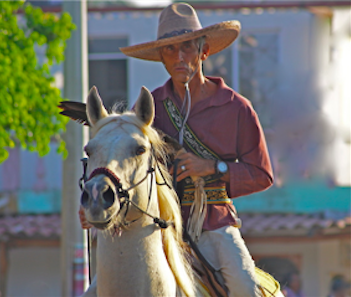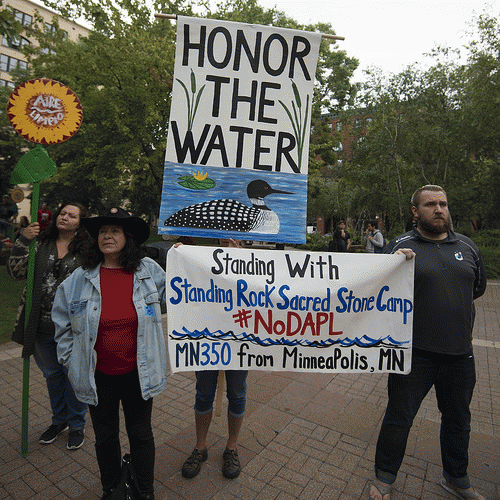Wahinkpe Topa (Four Arrows)
Fielding Graduate University
Over the past few decades universities have increasingly institutionalized the myth of objectivity. Standing up for positions on controversial public issues seldom comes from administrators on high. Worse, this unwillingness to do so has made its way into the hearts and minds of many faculty and students. The rationalization is that neutrality is an academic requirement. In his piece "Why the Revolution will not be Tweeted, Malcom Gladwell writes, "Where activists were once defined by their causes, they are now defined by their tools" (Gladwell, 2010). Although he was referring to social media, this applies equally to the focus on the "tools" offered in universities. As the title of Howard Zinn's autobiography states, however, we cannot be neutral on a moving train. If being so is the new mantra of fear-based, corporatized and consumer oriented schooling, we must leave the hard work of pro-social activism to those without college degrees it seems.
University silence on the Standing Rock Water Protection Movement in North Dakota is a case in point. As is happening elsewhere on the globe, Indigenous Peoples struggling to survive on their reservations are taking the lead in trying to make the world a better place for future generations. Representatives from higher education are strikingly absent. A Google search for "Universities and Standing Rock" and a variety of other related key word searches revealed only a large group of students at the University of San Francisco were gathering donations for the "water protectors;" the University of Colorado Law School is offering free legal services for those being arrested; 160 University of Toronto students, faculty and staff expressed support in their university newsletter; the California Faculty Association issued a strong statement of solidarity; and Stony Book faculty did so as well. One student at a town hall meeting at Souphanouvong University in Laos expressed support during Obama's visit (which led to Obama speaking out saying supportively that the Indian voice is being heard around the world and asking the corporation to voluntarily stop its action). A few Native American Student Associations on various campuses took a stand of course. Although all the Tribal College presidents have taken a position, I could not find another president that has done so.
I did come across an article in The Nation by Scott Sherman entitled, "University Presidents-Speak Out! (Where are their voices on the major issues of the day" (2013)? Sherman writes that the "timidity of presidents is particularly striking in the context of diminishing public funds for higher education." This says a lot about the corporatization and consumer orientation in higher education today I think. The article ends with a 1996 quote from Leon Botstein of Bard worth sharing:
A college president has an obligation to be more outspoken than the average citizen". Failure to be in a leadership role on matters of public policy"is an act of cowardice and an avoidance of responsibility. We need to teach our students that the civilized assertion of one's beliefs is an obligation, an honor, and a pleasure.
Sherman interviewed Botstein in 2013 for the article, asking him if he still felt the same way. Botstein replied "I would only strengthen the sentiment."
What does such silence in Higher Education mean specifically relating to the Standing Rock effort? How much do students know about this need to protect water against the steamrolling corporation infamously known for its corruption and bulldozing its way through and around permit processes and legislative or judicial bodies? Is it really best for higher education to avoid serious study and positioning of this topic to those outside the halls of ivory? Before commenting on this last question, I suggest we consider how many people outside of higher education are supporting Standing. For example, the Islamic Center of San Diego pledge its support as did Michael Curry, the Bishop of the Episcopal church. Many celebrities such as Joanie Mitchel, Neil Young, Johnny Dep, Leonardo DiCaprio, Susan Sarandon, Shaliene Woodley, have not only spoken out in support but many have been on the scene risking arrest. Robert Redford's support is articulated on Youtube and in a Time Magazine tweet where he writes:
Though not all of us are able to go to North Dakota and actually stand with Standing Rock, we can stand united. We can be a sea of people, rising up together to prevent the seas from rising and our history of mistreatment of Native Americas from repeating. The Sioux people of North Dakota aren't just fighting for their homes and their water. They're fighting for our homes and water, our families and futures, our children's chances for a habitable home. http://time.com/4501580/
As for politicians and federal agencies, Bernie Sanders has taken a strong stand. (http://kfor.com/2016/10/14/
Of course, most of the environmental groups from Greenpeace to 360.org have taken strong stands. After all, unlike the U.S. Republic legislators (and most universities), they know that climate change is human caused and a serious threat to our world and that this pipeline and the effort to stop it could be the turning point for the big oil companies to final move into the alternative energy business.
In light of these individuals, groups and agencies taking a position about the importance of this struggle in North Dakota, I return to my question, "Is it really best for higher education to leave the issue to those outside the halls of ivory? I do not believe it does. A professor in a class has the academic freedom to take a position if it is relevant at all to the course being taught. Oil extraction and transfer is relevant to most if not all courses. Good professors know that they must encourage students to question their positions and offer researched challenges if there is disagreement. This is the hallmark for teaching critical thinking in higher education. If deans, presidents, provosts cannot take a position on something as important as what is happening in Standing Rock for all the reasons being touted by the religious groups, the celebrities, and others, then we must ask if the reasons are based in fear of losing a "customer" or two more than on safeguarding the myth of objectivity. Fear of personal or political pushback may largely be responsible for moving us to the edge of mass extinction. If we have to let higher education take a back seat to movie stars to get the word out, we are not likely to solve our problems. When even sustainability groups at universities are reluctant to take a stand in solidarity with the water protectors at Standing Rock so as to avoid confrontation or because they see the efforts there as militant, we know our universities whose curriculum like the current presidential debates too seldom engage such topics, it should give us all pause. The sacred, prayerful and courageous efforts of the Standing Rock water protectors have a role to play in maintaining a healthy world for future generations. So do those involved in higher education.
(Note: You can view every article as one long page if you sign up as an Advocate Member, or higher).






